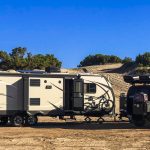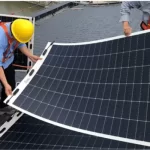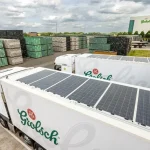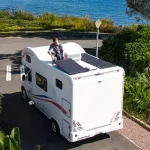Why Should You Charge Your Boat Battery with Solar Power?
As a marine solar engineer, one of the most frequent questions I get from boat owners is:
“Can I really rely on a Marine Battery with Solar Panels for my boat?”
The answer is a resounding yes.
When you’re out on the water—far from any marina or power dock—you need a reliable, independent power source. A solar boat charger is one of the smartest investments you can make to improve your boating lifestyle. It ensures your essential systems—navigation, communication, lighting, and even refrigeration—stay powered, without the need for running noisy diesel generators or heading back to shore.
And here’s the best part: solar power is clean, quiet, efficient, and nearly maintenance-free.
What Types of Solar Panels Are Best for Boats?
When selecting a solar battery charger for a marine battery, your first step is choosing the right solar panel type based on your vessel and needs. Here are the main categories:
rigid Solar Panels
-
Traditional rigid panels with high efficiency (18–22%)
-
Long lifespan—up to 25 years
-
Best for permanent installation on hardtops or large deck surfaces
-
Heavier and more durable, ideal for bluewater cruisers
Flexible and Lightweight Solar Panels
-
Designed using ETFE or PET layers over thin solar cells
-
Extremely light and can bend up to 30°
-
Perfect for curved decks, Bimini tops, or cabin roofs
-
Easy to install with adhesive or Velcro
Portable Solar Panels and Folding Solar Kits
-
Lightweight and foldable, often come in briefcase or bag-style designs
-
Great for temporary use, anchoring, or emergency backup
-
Can be stowed when not in use
Each option supports a range of solar power setups, from small weekend cruisers to full-time liveaboard vessels.
What Equipment Do You Need to Build a Complete Solar Charging System?
To make a solar battery charger for your boat work efficiently, you’ll need more than just panels. Here’s a breakdown of the essential components for a solar power boat battery charger system:
Solar Charge Controller
-
Regulates voltage and current from solar panels to your battery
-
Prevents overcharging, reverse current, and deep discharge
-
Choose MPPT (Maximum Power Point Tracking) for maximum efficiency
Deep Cycle Marine Battery
-
Stores solar energy for use when the sun isn’t shining
-
Designed for continuous discharge and recharge cycles
-
AGM, Gel, or Lithium Iron Phosphate (LiFePO4) recommended
Inverter (if using AC-powered appliances)
-
Converts DC power to AC
-
Choose based on your total AC load (fridge, microwave, etc.)
-
Pure sine wave inverters offer better performance
Cables & Marine-Grade Connectors
-
Use tinned copper marine wires to resist corrosion
-
Proper gauge prevents voltage drop
-
Waterproof MC4 connectors recommended for outdoor use
How Do You Install a Solar Panel System on a Boat?
Installing a solar battery charger for marine batteries isn’t complicated, but it must be done right. As an engineer, I always follow these steps:
1. Determine Your Power Needs
Estimate your daily energy consumption (in amp-hours, Ah). For example:
| Device | Power Usage | Hours/day | Total Ah/day |
|---|---|---|---|
| LED Lights | 2A | 5 | 10Ah |
| GPS/Navigation | 1.5A | 8 | 12Ah |
| Fridge | 3A | 10 | 30Ah |
| Phone Charging | 1A | 2 | 2Ah |
| Total Daily Load | 54Ah |
If you expect 5 full sun hours per day, a 100W–150W solar panel would be ideal, possibly more depending on system efficiency.
If you expect 5 full sun hours per day, a 100W–150W solar panel would be ideal, possibly more depending on system efficiency.
2. Mount the Solar Panel
-
Choose a spot with maximum sunlight exposure, minimal shading
-
Use tilt mounts or flexible adhesive mounts, depending on panel type
-
Ensure cables are secured and waterproof
3. Wire the Charge Controller
-
Connect the solar panel to the input terminals
-
Connect the battery to the output terminals
-
Always connect battery before panel to avoid controller damage
4. Connect the Battery
-
Use proper cable gauge based on current (10AWG or larger)
-
Ensure tight, clean, corrosion-free connections
-
Use fuses or circuit breakers for safety
How Do You Maintain a Solar Battery Charger for Your Boat?
Maintenance is simple but critical for performance and longevity. Here’s how I advise clients to keep their solar battery charger for boat systems in top condition:
Clean the Solar Panels
-
Use soft cloth and fresh water every 2–4 weeks
-
Remove salt buildup, bird droppings, or dust that blocks sunlight
Check All Connections
-
Inspect for corrosion, loose terminals, or insulation damage
-
Use dielectric grease on connectors for added protection
Monitor Battery Health
-
Use a battery monitor or controller with display
-
Track voltage, state of charge (SOC), and temperature
-
Replace aged batteries (typical lifespan: 5–10 years depending on type)
Prepare for Weather
-
Waterproof all components and mountings
-
Disconnect the system if storing the boat for long periods
What Are the Top 5 Questions Boat Owners Ask About Solar Charging?
1. How do I calculate the right size solar panel for my boat?
Add up your daily power use in amp-hours and divide by the expected sun hours. Add 20–30% buffer for cloudy days or system losses.
2. Do solar panels work when it’s cloudy or raining?
Yes, but output may drop by 50–80%. MPPT charge controllers help improve performance in low-light conditions.
3. Can I use a solar panel to charge my engine starting battery?
Technically yes, but it’s best to use a dual-bank system with an isolator or charge manager to prioritize starting battery when full.
4. How long does it take to charge a marine battery with solar?
A 100W panel can produce ~5A/hour under peak sun. To charge a 100Ah battery from 50% to 100%, you’d need about 10 hours of good sunlight.
5. What’s better—rigid or flexible solar panels for marine use?
Rigid panels last longer and perform better in high heat. Flexible panels are lighter and easier to install on curves. The best option depends on your space and application.
Is a Solar Boat Battery Charger Worth It?
In my professional opinion—absolutely. A solar battery charger for marine batteries offers:
-
Independence from shore power
-
Quiet, clean energy production
-
Reliable power for your electronics and safety systems
-
Reduced generator use and fuel consumption
Whether you’re a weekend sailor or a full-time liveaboard, a properly installed solar power boat battery charger system gives you freedom and peace of mind.
Want the Right Solar Panel for Your Boat?
At Sungold Solar, we provide:
-
Marine-grade solar panels – glass, flexible, and portable
-
OEM/ODM services for solar boat charger systems
-
Support for 12V / 24V marine battery banks
-
Products certified by TÜV, CE, RoHS, FCC







